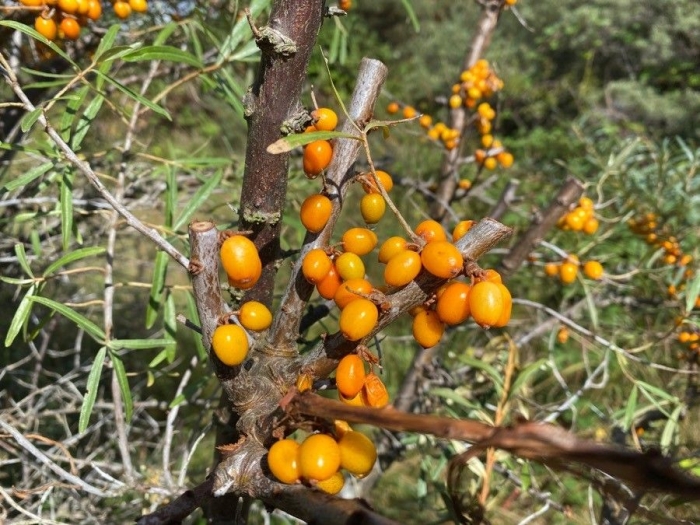Sea-Buckthorn
(Hippophae rhamnoides)
Sea-Buckthorn (Hippophae rhamnoides)
/
/

grutz
CC BY-SA 4.0
Image By:
grutz
Recorded By:
Copyright:
CC BY-SA 4.0
Copyright Notice:
Photo by: grutz | License Type: CC BY-SA 4.0 | License URL: https://creativecommons.org/licenses/by-sa/4.0/ | Attribution: grutz (cc-by-sa) | Rights Holder: grutz | Publisher: PlantNet | Date Created: 2020-08-27T11:55:50.427Z | Title: Hippophae rhamnoides L.: fruit | Notes: |













































Estimated Native Range
Summary
Hippophae rhamnoides, commonly known as Sea-Buckthorn, is a deciduous shrub native to a variety of habitats including coastal areas, riverbanks, and semi-desert regions across Eurasia. It typically grows between 2 and 4 meters high (7 to 13 feet) and is known for its rough, brown or black bark and dense, grayish-green crown. The leaves are alternate, narrow, and lanceolate, with a distinctive silvery-green color on the upper side. Sea-Buckthorn is dioecious, with male and female flowers on separate plants. The plant is wind-pollinated, requiring close proximity of male to female plants for fruit set. The fruits are small, oval to round, and range in color from pale yellow to dark orange, often found in dense clusters.
Sea-Buckthorn is valued for its hardiness and the nutritional value of its berries, which are rich in vitamins and antioxidants. It is used for soil stabilization, wildlife habitat, and ornamental purposes in gardens and landscapes. The berries are harvested for various culinary and medicinal products. This shrub thrives in full sun and can tolerate a range of soil conditions, though it prefers deep, well-drained sandy loam with organic matter. It is drought-resistant but requires adequate moisture during flowering and fruit development. Sea-Buckthorn can withstand extreme temperatures from −43°C to +40°C and can produce fruit at altitudes up to 2000 meters. It has a nitrogen-fixing ability, which reduces the need for fertilization. The plant typically begins fruiting 4 to 5 years after seed germination and reaches peak production in the 7th to 8th year. Potential issues include susceptibility to pests like aphids and diseases such as leaf spot, though it is generally considered a low-maintenance plant.CC BY-SA 4.0
Sea-Buckthorn is valued for its hardiness and the nutritional value of its berries, which are rich in vitamins and antioxidants. It is used for soil stabilization, wildlife habitat, and ornamental purposes in gardens and landscapes. The berries are harvested for various culinary and medicinal products. This shrub thrives in full sun and can tolerate a range of soil conditions, though it prefers deep, well-drained sandy loam with organic matter. It is drought-resistant but requires adequate moisture during flowering and fruit development. Sea-Buckthorn can withstand extreme temperatures from −43°C to +40°C and can produce fruit at altitudes up to 2000 meters. It has a nitrogen-fixing ability, which reduces the need for fertilization. The plant typically begins fruiting 4 to 5 years after seed germination and reaches peak production in the 7th to 8th year. Potential issues include susceptibility to pests like aphids and diseases such as leaf spot, though it is generally considered a low-maintenance plant.CC BY-SA 4.0
Plant Description
- Plant Type: Shrub
- Height: 8-12 feet
- Width: 8-12 feet
- Growth Rate: Moderate
- Flower Color: N/A
- Flowering Season: Spring
- Leaf Retention: Deciduous
Growth Requirements
- Sun: Full Sun
- Water: Medium
- Drainage: Medium
Common Uses
Bank Stabilization, Drought Tolerant, Edible*Disclaimer: Easyscape's listed plant edibility is for informational use. Always verify the safety and proper identification of any plant before consumption., Erosion Control, Fire Resistant, Hedges, Low Maintenance, Salt Tolerant, Street Planting
Natural Habitat
Coastal areas, riverbanks, and semi-desert regions across Eurasia
Other Names
Common Names: Sallowthorn , Sea Buckthorn , Seaberry , Seabuckthorn , Havtorn , Sanddorn , Espino Armarillo , Espino Falso , Tyrni , Argousier
Scientific Names: Hippophae rhamnoides , Hippophae rhamnoides var. procera , Rhamnoides hippophii
GBIF Accepted Name: Hippophae rhamnoides L.